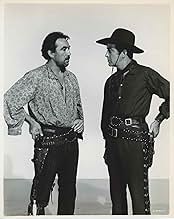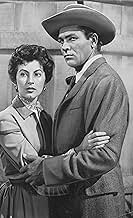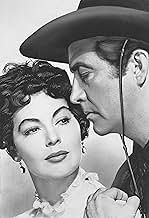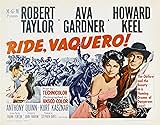NOTE IMDb
6,1/10
1,2 k
MA NOTE
Ajouter une intrigue dans votre langueTwo outlaws, Rio and Esqueda, raised together as stepbrothers, have a showdown over the issue of whether to evict new settlers from their territory.Two outlaws, Rio and Esqueda, raised together as stepbrothers, have a showdown over the issue of whether to evict new settlers from their territory.Two outlaws, Rio and Esqueda, raised together as stepbrothers, have a showdown over the issue of whether to evict new settlers from their territory.
- Réalisation
- Scénario
- Casting principal
Stanley Andrews
- Gen. Sheridan
- (non crédité)
Arthur Berkeley
- Townsman
- (non crédité)
Monte Blue
- Bartender
- (non crédité)
Chet Brandenburg
- Townsman
- (non crédité)
Avis à la une
Before I saw this movie, I had not heard of the director John Farrow. After some research I found that he was the father of Mia Farrow. I also found that he had good writing skills. This is apparent after you view this film closely. The lead characters are Rio (Robert Taylor) and Esqueda (Anthony Quinn) who turn out to be each others alter ego--one man slaps a woman who kisses him and the other kisses a woman before she slaps him.
It's an unusual western because there is no hero--only a handsome troubled anti-hero. It is an unusual western in that Mexicans are not always painted as bad or stupid--it presents them as human beings. Even the 'bad' Esqueda has reverence for God's blessings. This probably is a result of Farrow's Catholicism as it is in the case when the priest gives the final blessings to the dead anti-hero (whose body is not shown, for some strange reason). An unusual way to end a film.
Evidently Farrow espoused family values--the couple's marriage is strengthened and Rio says his adopted mother would not have approved of her son Esqueda's actions. The family bonds between Rio and Esqueda are the cornerstones of the script, with doses of Catholicism and social comments thrown in. Something tells me the film we see today is not what the director intended to show--perhaps the studios had their say. The loose editing makes one wonder what was going on.
As far as performances, I think this is one of Quinn's finest unsung performances. Taylor is handsome and plays the dark anti-hero well--predictably dressed in dark colors. Ava Gardner's role is supposed to be heroic--dressed in white--but is it so simplistic to dismiss it as such. Is it a coincidence that she behaves differently when she wears pink?
It is a strange and a fascinating trio--Taylor, Quinn and Gardner. Farrow had, in my view, a great chance to make a memorable film but somehow fumbled.
It's an unusual western because there is no hero--only a handsome troubled anti-hero. It is an unusual western in that Mexicans are not always painted as bad or stupid--it presents them as human beings. Even the 'bad' Esqueda has reverence for God's blessings. This probably is a result of Farrow's Catholicism as it is in the case when the priest gives the final blessings to the dead anti-hero (whose body is not shown, for some strange reason). An unusual way to end a film.
Evidently Farrow espoused family values--the couple's marriage is strengthened and Rio says his adopted mother would not have approved of her son Esqueda's actions. The family bonds between Rio and Esqueda are the cornerstones of the script, with doses of Catholicism and social comments thrown in. Something tells me the film we see today is not what the director intended to show--perhaps the studios had their say. The loose editing makes one wonder what was going on.
As far as performances, I think this is one of Quinn's finest unsung performances. Taylor is handsome and plays the dark anti-hero well--predictably dressed in dark colors. Ava Gardner's role is supposed to be heroic--dressed in white--but is it so simplistic to dismiss it as such. Is it a coincidence that she behaves differently when she wears pink?
It is a strange and a fascinating trio--Taylor, Quinn and Gardner. Farrow had, in my view, a great chance to make a memorable film but somehow fumbled.
Even though it's not great, Quinn's performance is memorable and he really looks - and plays - the part.
I'm also intrigued by a couple of brief scenes in this film - a wide shot of a cavalry fort and the shot of mounted troopers riding out look awfully like they came from "She Wore A Yellow Ribbon". Did John Ford help the producers fill a couple of small gaps?
Howard Keel looked much more at home in "Pagan Love Song".
Robert Taylor looks like he wore his "Billy the Kid" duds again.
It's difficult to find a good, crisp copy of the film, but worth the effort.
I'm also intrigued by a couple of brief scenes in this film - a wide shot of a cavalry fort and the shot of mounted troopers riding out look awfully like they came from "She Wore A Yellow Ribbon". Did John Ford help the producers fill a couple of small gaps?
Howard Keel looked much more at home in "Pagan Love Song".
Robert Taylor looks like he wore his "Billy the Kid" duds again.
It's difficult to find a good, crisp copy of the film, but worth the effort.
If shoot 'em up westerns are to your taste, this is probably not your cup of tea.
The theme of Civilization vs. Barbarism is nicely explored in this very unusual western. The dialog is light years beyond the dialog in most westerns. Specifically, Rio's dialog is some of the best ever written for any character in any film of this genre. Whoever wrote it must have been bi-lingual. From his syntax, it is clear Rio speaks English as his second language. It is as if he is speaking Anglicized Spanish proverbs half of the time. Very Spanish.
The gay subtext is unmistakable in the scenes between Rio and Esqueda, yet it is fairly subtle. Rio's beautiful horse and its livery, and his attire all summon up images of early cinematic western heroes. Rio looks like the Cisco Kid's dark alter- ego!
It is difficult to accept Cameron's faith that Rio is honorable enough not to kill him once he turns his back. This issue really has two aspects: One is the credibility of Cameron's trust; the second is Rio's actual trustworthiness. Today we find it difficult to believe BOTH that Cameron would be so trusting of Rio and that Rio actually would turn out to be trustworthy. Our credulity is again stretched by Cameron's entrusting Rio with his ranch and wife.
But Cameron is a newcomer to the territory, and he values Rio's savvy - about horses, ranch hands and probably survival! Cameron tells Rio that he wants him to help acquire horses for the ranch. Later Cameron's wife asks Rio about the sudden abundance of ranch hands which Cameron wasn't able to hire on his own. These things validate Cameron's motive, implausible as it may seem. I just accept that Cameron is pretty desperate and that he is a good judge of character.
Regarding Rio: There was a time when a man felt like he owed his life to someone who had saved (or spared) it. Perhaps most men still lived by that code of honor at the time the movie is set. Or perhaps this was preserved longer in Hispanic culture - Rio's culture. Or perhaps Rio is simply a throw-back in his adherence to such a code. Anyway, the issue did not ruin the movie for me.
Delia seems particularly naive (or stupid) for getting Rio to take her to plead Cameron's case with Esqueda.
Despite these weaknesses, I enjoyed the film. It never really made me feel excitement, but it generated palpable tension among several characters. However, its uniqueness and dialog were what kept me interested throughout. I found Rio to be one of the most fascinating characters in this entire genre. One of my favorite scenes is when Esqueda is kicked back in his chair in the saloon with his filthy, bare feet thrust toward the camera. Nope, not your typical western!
The theme of Civilization vs. Barbarism is nicely explored in this very unusual western. The dialog is light years beyond the dialog in most westerns. Specifically, Rio's dialog is some of the best ever written for any character in any film of this genre. Whoever wrote it must have been bi-lingual. From his syntax, it is clear Rio speaks English as his second language. It is as if he is speaking Anglicized Spanish proverbs half of the time. Very Spanish.
The gay subtext is unmistakable in the scenes between Rio and Esqueda, yet it is fairly subtle. Rio's beautiful horse and its livery, and his attire all summon up images of early cinematic western heroes. Rio looks like the Cisco Kid's dark alter- ego!
It is difficult to accept Cameron's faith that Rio is honorable enough not to kill him once he turns his back. This issue really has two aspects: One is the credibility of Cameron's trust; the second is Rio's actual trustworthiness. Today we find it difficult to believe BOTH that Cameron would be so trusting of Rio and that Rio actually would turn out to be trustworthy. Our credulity is again stretched by Cameron's entrusting Rio with his ranch and wife.
But Cameron is a newcomer to the territory, and he values Rio's savvy - about horses, ranch hands and probably survival! Cameron tells Rio that he wants him to help acquire horses for the ranch. Later Cameron's wife asks Rio about the sudden abundance of ranch hands which Cameron wasn't able to hire on his own. These things validate Cameron's motive, implausible as it may seem. I just accept that Cameron is pretty desperate and that he is a good judge of character.
Regarding Rio: There was a time when a man felt like he owed his life to someone who had saved (or spared) it. Perhaps most men still lived by that code of honor at the time the movie is set. Or perhaps this was preserved longer in Hispanic culture - Rio's culture. Or perhaps Rio is simply a throw-back in his adherence to such a code. Anyway, the issue did not ruin the movie for me.
Delia seems particularly naive (or stupid) for getting Rio to take her to plead Cameron's case with Esqueda.
Despite these weaknesses, I enjoyed the film. It never really made me feel excitement, but it generated palpable tension among several characters. However, its uniqueness and dialog were what kept me interested throughout. I found Rio to be one of the most fascinating characters in this entire genre. One of my favorite scenes is when Esqueda is kicked back in his chair in the saloon with his filthy, bare feet thrust toward the camera. Nope, not your typical western!
I've always felt that Ride Vaquero was one of the weakest of Robert Taylor's westerns. In playing Rio, Taylor certainly essayed one of the darkest characters he ever brought to the screen.
It's the end of the Civil War and bandit Anthony Quinn has certainly had his run of things in the area. But the Yankee army will be occupying Texas shortly. Common sense would dictate that Quinn realize the jig is up that he'd better move on. At least his foster brother Taylor thinks so, but Quinn is drunk with power and he ain't going nowhere.
Taylor finds some reason to stay when he takes one look at Ava Gardner newly arrived in Brownsville, but with husband Howard Keel. They're settling on a cattle ranch and Keel has some big plans.
Most of the story I got, but quite frankly two points of it were ridiculous. Why Keel would even consider hiring Taylor after Taylor tried to burn him out. And secondly why Ava had Taylor take her to Quinn's camp to convince him to leave her and Keel alone. Those two things make absolutely no sense at all.
Quinn is repeating the blustering role he had in Viva Zapata. But that film had a lot more depth to it. I think Quinn realized that and blustered all the more.
Other reviewers commented on the undertone of a repressed gay crush that Quinn had for Taylor. It certainly might explain Quinn's motivations. But Anthony Quinn dealt with that issue six years later in Warlock, a much better western.
It's a bad script with character motivations that make no sense. Still a good cast does the best they can by it.
It's the end of the Civil War and bandit Anthony Quinn has certainly had his run of things in the area. But the Yankee army will be occupying Texas shortly. Common sense would dictate that Quinn realize the jig is up that he'd better move on. At least his foster brother Taylor thinks so, but Quinn is drunk with power and he ain't going nowhere.
Taylor finds some reason to stay when he takes one look at Ava Gardner newly arrived in Brownsville, but with husband Howard Keel. They're settling on a cattle ranch and Keel has some big plans.
Most of the story I got, but quite frankly two points of it were ridiculous. Why Keel would even consider hiring Taylor after Taylor tried to burn him out. And secondly why Ava had Taylor take her to Quinn's camp to convince him to leave her and Keel alone. Those two things make absolutely no sense at all.
Quinn is repeating the blustering role he had in Viva Zapata. But that film had a lot more depth to it. I think Quinn realized that and blustered all the more.
Other reviewers commented on the undertone of a repressed gay crush that Quinn had for Taylor. It certainly might explain Quinn's motivations. But Anthony Quinn dealt with that issue six years later in Warlock, a much better western.
It's a bad script with character motivations that make no sense. Still a good cast does the best they can by it.
Strangely enough, the best acting job is turned in by Howard Keel. Quinn is, as usual, over the top (albeit, also per usual, entertainingly so) what with his yelling, snarling, cackling and sneering, while Rat Fink Bob, perhaps realizing he cannot compete with such antics, is monosyllabic, often to the point of incomprehension. Ava, as always, is on the wooden side, so that leaves the old Showboat songster, in the stolid, Paul Henried role and managing to unstiffen the fellow, as the guy who gives the most natural performance.
Alas, Keel's unpretentiousness does not extend to Frank Fenton's screenplay which has a tendency to go off on wild, philosophical tangents, especially when Kurt Kazner's priest is around, which is fairly often.
Bottom line: Typical John Farrow film. Good enough to keep you watching but not good enough to want to see it again. C plus.
PS...Almost forgot to mention a good, early Jack Elam bad guy role, thrown in for no extra charge.
Alas, Keel's unpretentiousness does not extend to Frank Fenton's screenplay which has a tendency to go off on wild, philosophical tangents, especially when Kurt Kazner's priest is around, which is fairly often.
Bottom line: Typical John Farrow film. Good enough to keep you watching but not good enough to want to see it again. C plus.
PS...Almost forgot to mention a good, early Jack Elam bad guy role, thrown in for no extra charge.
Le saviez-vous
- AnecdotesAccording to Mia Farrow's book, "What Falls Away," her father John Farrow and Ava Gardner were having an affair during filming in 1953. Mia married Gardner's ex-husband Frank Sinatra in 1966.
- GaffesWhen Jose throws a knife closely past Barton's head, the knife zips past Jose before his arm finishes the throwing motion. This is probably because the knife was either mechanically propelled or thrown by an off-screen expert to make the stunt safer than it would be if the actor had thrown the knife.
- Citations
Jose Esqueda: The strong will fight the strong, Señora, for possession of the weak. You see, it's not a personal matter at all.
Cordelia Cameron: And the meek shall never inherit the earth.
Jose Esqueda: Only six feet of it, Señora.
- ConnexionsFeatured in 100 Years of the Hollywood Western (1994)
Meilleurs choix
Connectez-vous pour évaluer et suivre la liste de favoris afin de recevoir des recommandations personnalisées
- How long is Ride, Vaquero!?Alimenté par Alexa
Détails
Box-office
- Budget
- 1 128 000 $US (estimé)
- Durée
- 1h 30min(90 min)
- Rapport de forme
- 1.37 : 1
Contribuer à cette page
Suggérer une modification ou ajouter du contenu manquant






































